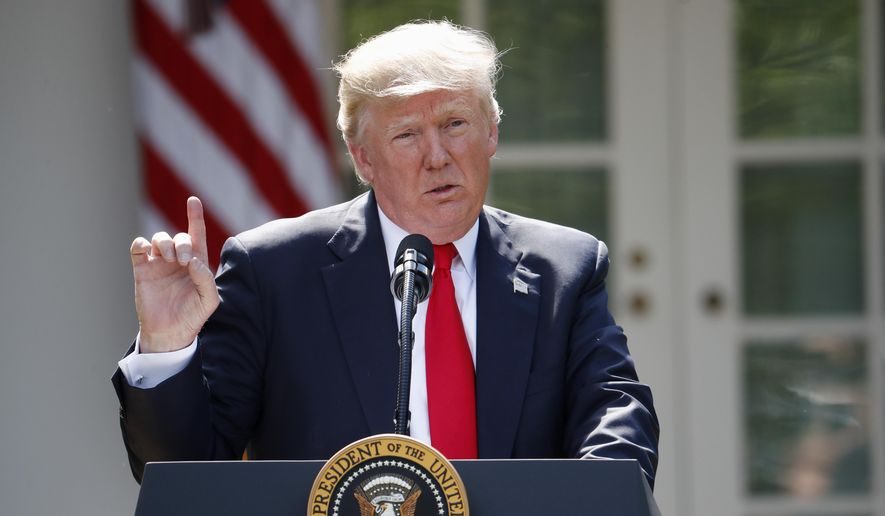On the same day the U.S. and Syria became the final two holdouts in the landmark Paris climate pact, State Department officials deflected questions about rejoining the accord and placed the full burden of renegotiating more favorable terms squarely on President Trump’s shoulders.
State Department officials said the plan to pull out of the Paris deal, the crowning environmental achievement of former President Barack Obama, is moving forward unless Mr. Trump personally can secure an agreement that benefits U.S. interests. The statements came on the same day that Nicaragua formally announced its attention to sign a Paris pledge, making the U.S. and Syria the final two countries that remain out of it.
Mr. Obama signed the pact in December 2015, committing to cut U.S. greenhouse gas emissions by at least 26 percent by 2025 when compared to 2005 levels. But Mr. Trump over the summer said the deal unfairly penalizes America while letting many nations — most notably China, the world’s top polluter — off relatively easily.
Mr. Trump said he’d be open to re-entering the deal under more favorable terms, but nearly five months later, there’s been little sign the administration is actively trying to get back into Paris.
“The administration’s position on the Paris Agreement remains unchanged. The United States intends to withdraw from the Paris Agreement as soon as it is eligible to do so, unless the president can identify terms that are more favorable to American businesses, workers, and taxpayers,” State Department spokesperson Noel Clay told The Washington Times in a statement. “The president determined the terms of our current engagement in the Paris Agreement did not balance those factors, which is why he announced his plan to exit the Paris Agreement unless and until a better deal can be secured for the American people.”
Secretary of State Rex W. Tillerson reportedly favored staying in the Paris deal, but was overruled by the president. He did not attend a June ceremony at the Rose Garden where Mr. Trump announced the U.S. exit.
White House officials also would not shed much light on whether there’s a concerted effort to renegotiate the Paris deal.
“There has been no change in the United States position on the Paris agreement. As the president previously stated, the United States is withdrawing unless we can re-enter on terms the are more favorable for our country,” said White House spokesperson Lindsey Walters.
Meanwhile, the U.S. is now in the company of only Syrian President Bashar Assad in rejecting the accord.
Nicaragua, which initially stayed out of the deal because it said it did not go far enough, announced it would sign on.
“It is time for Nicaragua to sign the Paris agreement,” said Rosario Murillo, Nicaragua’s vice president, as quoted by The Guardian. “It is the only instrument we have in the world that allows the unity of intentions and efforts to face up to climate change and natural disasters.”
It’s not yet clear exactly what Nicaragua’s commitments will be under the agreement. Many countries have offered weak proposals to cut their emissions — one of the reasons Mr. Trump pulled the U.S. out.
China, for example, has committed only to capping its emissions by 2030, meaning it can continue increasing its greenhouse gas output between now and then. A host of other nations set ambitious targets, but they were often contingent on international financial assistance, including billions of dollars courtesy of the U.S. taxpayer.
Mr. Trump said in June that the notion of sending American money to help other countries cut their pollution is unacceptable.
“I was elected to represent the citizens of Pittsburgh, not Paris,” he said in June. “I promised I would exit or renegotiate any deal that doesn’t serve America’s interests.”
While the federal government has backed away from the agreement, a number of states and cities across the country have said they’ll remain committed to the emissions goals laid out in the Paris pledge. California, for example, has said it intends to meet the 26 percent threshold with respect to its own emissions.
• Ben Wolfgang can be reached at bwolfgang@washingtontimes.com.




Please read our comment policy before commenting.